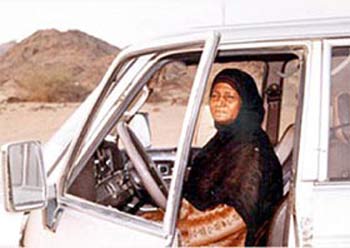
Saudi Woman Continues Driving After 20 Years Despite the Odds
Jeddah, Asharq Al-Awsat – In the desert near this western Saudi city, lives a woman named Ghalia, aged 60, in severe natural conditions that make her an exception to the rule. She competes with men in order to enable her family to lead a respectable life, just like those who create a house from a sticks and a palace from stone.
Ghalia has been driving for more than twenty years. She tells the story of a difficult life and continues to labor until this day. Her wrinkly face tells the observer that there is more than life than mere subsistence. Speaking about her driving, Ghalia says, “I did not encounter any opposition but no one encouraged me. My support came from within.” Necessity made her break all the barriers and stand up for herself. Ghalia rejected inequality and the dominance of men. Instead, she inaugurated an eternal partnership.
Reminiscing about the first car she ever drove, Ghalia said, “That was a very long time ago. As far as I remember it was a 1979 model Jeep.” Given the mountainous terrain and sand dunes she lives in, Ghalia prefers a four-wheel drive Jeep. “I drive to the nearby villages and the fields to visit my women friends and in order to buy and sell”. However, she quickly added she avoids driving in places where the security services can be found. Ghalia has never driven a car on a paved road. It is because, “I do not have a license”, she says jokingly.
Ghalia can easily change tires in case of a puncture but requires additional support to repair mechanical failures. She strenuously denies claims by other men that she carries weapons. “I have never carried weapons. The location is safe given the proximity of the villages I drive to.” She does not recall any incidents cause by her driving.
Living with her brother and her family, Ghalia never married. Her father died when she was young. She decries the difficulty of everyday life; “We lack a regular income. We rely on selling and buying goats and cows. Work is sometimes hard. Driving has saved me time and effort. We, the older generation, work for them,” she said, pointing towards her young nephews and nieces.
Ghalia understands the desire for women to drive. They, like her, have needs. In meetings with other women, she often gets asked about driving. Ghalia always answers confidently. When asked about whether women can drive in the city, Ghalia hesitates and says, “No, this will never happen.” After a short period of silence, she added, “Generally speaking, women are weak and traffic accidents are many. Women want to drive in cities and populated areas should respect traffic laws and not distance themselves from their homes as this is safer”, she advised.
On the subject of men, Ghalia criticized their view of women who drove and described it as unfounded suspicion. Men do not trust women and belittle their abilities. The relation between the two sexes was one of guardianship, she said.
For her part, Ghalia continues to reject customs and chooses to lead her life as she pleases. Her story on that barren land continues to unfold.
